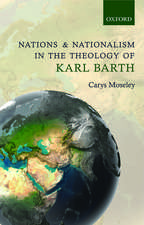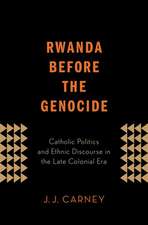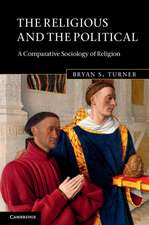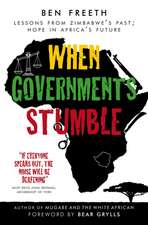The Modern Papacy: Major Conservative and Libertarian Thinkers
Autor Dr. Samuel Greggen Limba Engleză Paperback – 13 mar 2013
| Toate formatele și edițiile | Preț | Express |
|---|---|---|
| Paperback (1) | 220.98 lei 6-8 săpt. | |
| Bloomsbury Publishing – 13 mar 2013 | 220.98 lei 6-8 săpt. | |
| Hardback (1) | 940.44 lei 6-8 săpt. | |
| Bloomsbury Publishing – 14 iul 2009 | 940.44 lei 6-8 săpt. |
Din seria Major Conservative and Libertarian Thinkers
- 23%
 Preț: 940.44 lei
Preț: 940.44 lei - 15%
 Preț: 182.63 lei
Preț: 182.63 lei -
 Preț: 325.15 lei
Preț: 325.15 lei -
 Preț: 213.99 lei
Preț: 213.99 lei - 14%
 Preț: 220.98 lei
Preț: 220.98 lei - 14%
 Preț: 220.98 lei
Preț: 220.98 lei - 14%
 Preț: 220.54 lei
Preț: 220.54 lei -
 Preț: 213.99 lei
Preț: 213.99 lei -
 Preț: 182.63 lei
Preț: 182.63 lei -
 Preț: 182.18 lei
Preț: 182.18 lei - 24%
 Preț: 181.29 lei
Preț: 181.29 lei -
 Preț: 188.51 lei
Preț: 188.51 lei - 15%
 Preț: 182.18 lei
Preț: 182.18 lei - 14%
 Preț: 189.86 lei
Preț: 189.86 lei -
 Preț: 213.99 lei
Preț: 213.99 lei -
 Preț: 220.98 lei
Preț: 220.98 lei -
 Preț: 188.09 lei
Preț: 188.09 lei - 15%
 Preț: 188.09 lei
Preț: 188.09 lei
Preț: 220.98 lei
Preț vechi: 256.87 lei
-14% Nou
Puncte Express: 331
Preț estimativ în valută:
42.29€ • 44.49$ • 35.29£
42.29€ • 44.49$ • 35.29£
Carte tipărită la comandă
Livrare economică 10-24 ianuarie 25
Preluare comenzi: 021 569.72.76
Specificații
ISBN-13: 9781441136848
ISBN-10: 1441136843
Pagini: 176
Dimensiuni: 140 x 213 x 15 mm
Greutate: 0.25 kg
Editura: Bloomsbury Publishing
Colecția Bloomsbury Academic
Seria Major Conservative and Libertarian Thinkers
Locul publicării:New York, United States
ISBN-10: 1441136843
Pagini: 176
Dimensiuni: 140 x 213 x 15 mm
Greutate: 0.25 kg
Editura: Bloomsbury Publishing
Colecția Bloomsbury Academic
Seria Major Conservative and Libertarian Thinkers
Locul publicării:New York, United States
Caracteristici
Major Conservative and Libertarian Thinkers provides comprehensive accounts of the works of seminal conservative thinkers from a variety of periods, disciplines and traditions -- the first series of its kind. Even the selection of thinkers adds another aspect to conservative thinking, including not only theorists but also thinkers in literary forms and those who are also practitioners. The series comprises 20 volumes, each including an intellectual biography, historical context, critical exposition of the thinker's work, reception and influence, contemporary relevance, bibliography including references to electronic resources and an index.
Notă biografică
Samuel Gregg is Director of Research at the Acton Institute. He is the author of several books, including Morality, Law, and Public Policy (2000), Economic Thinking for the Theologically Minded (2001), On Ordered Liberty (2003), The Commercial Society (2007), as well as monographs such as Ethics and Economics: The Quarrel and the Dialogue (1999), A Theory of Corruption (2004), and Banking, Justice, and the Common Good (2005).
Cuprins
Series IntroductionSeries Editor's Preface Author's PrefaceAcknowledgementsChapter 1. Encountering ModernityIn Enlightenment's WakeFrom 'Intransigence' to Critical EngagementFrom Engagement to CrisisA Philosopher from KrakówA Theologian of Land BayernA New Papacy, A Distinct AgendaChapter 2. Against the Dissolution of ManRestoring Wisdom to Reason, and Faith in ReasonA Crisis of Truth and FreedomReturning Europe to EuropeSeeking ResponsesChapter 3. Inside the Modern Areopagus Restorationists, Accomodationists, and LiberationistsModernity Critics, New Natural Lawyers, and Catholic WhigsSecular Rejection, Secular EngagementA New Terrain Chapter 4. Paradoxes of EnlightenmentEnlightenment, Progress, and Ideologies of EvilBenedict at Regensburg A Wider AgendaTwenty-First Century ChallengesBibliographyIndex
Recenzii
The volumes in this timely series comprise the most comprehensive body of material on conservative and libertarian thought yet published in a single project devoted to the subject. The series will prove an indispensable tool not only for those concerned with the history of political thought but also for those who confront the challenging task of constructing a viable contemporary conservative identity. Professor Meadowcroft had a difficult editorial task, to which he has responded with a judicious choice of thinkers and topics.
Gregg's work is a useful introduction to the thought of Wojtyla and Ratzinger and thus essential reading for anyone engaged in serious study of the present-day papacy.
Gregg's work is a useful introduction to the thought of Wojtyla and Ratzinger and thus essential reading for anyone engaged in serious study of the present-day papacy.













